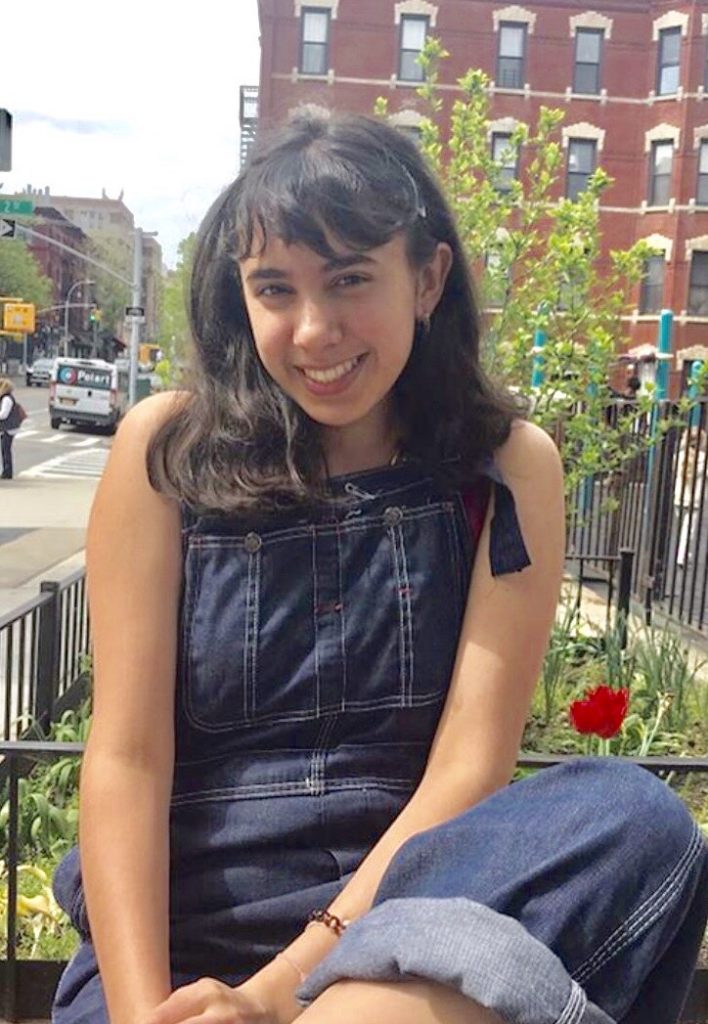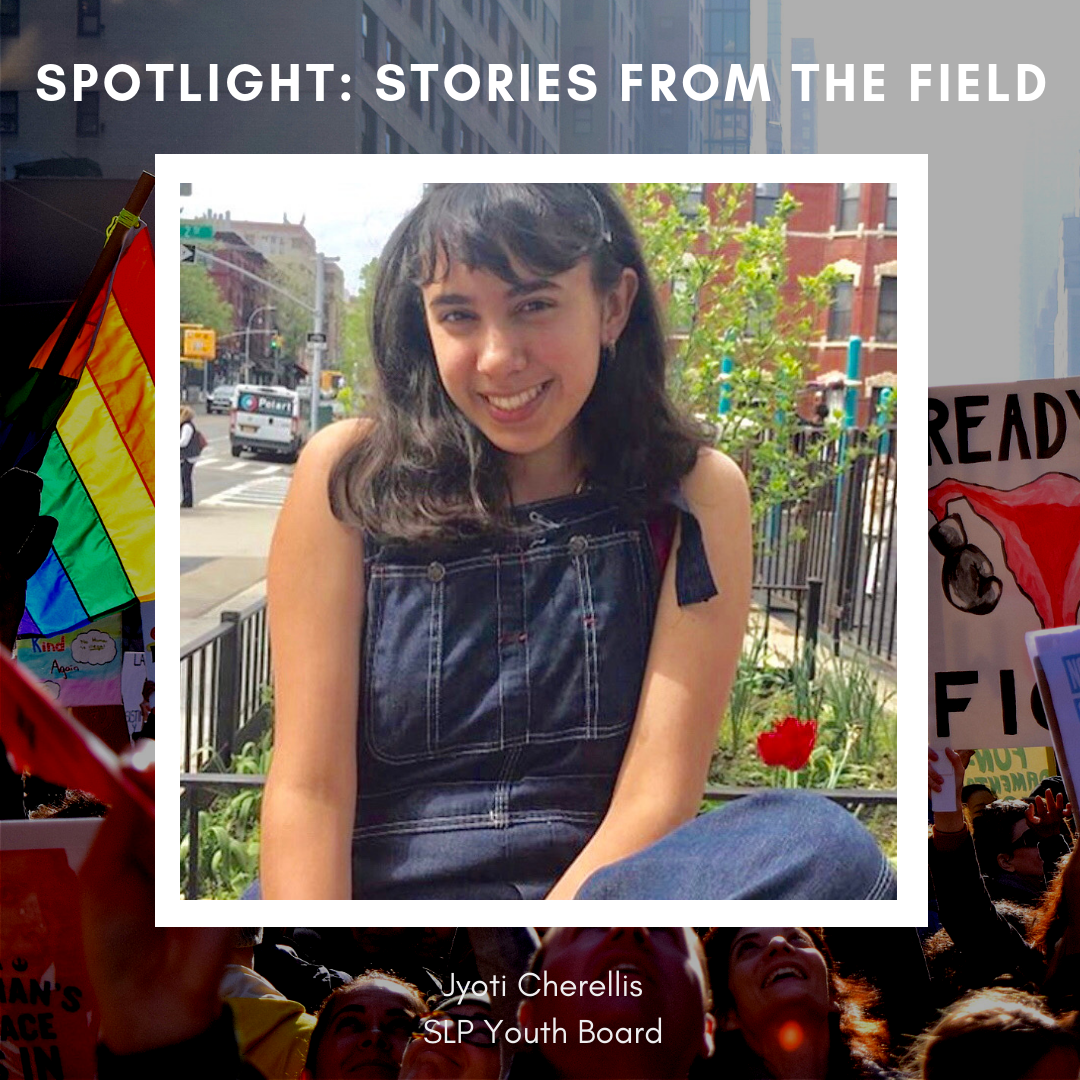
As we kick off the 2019-20 school year, we are excited to share a new interview from our Spotlight Series, which features stories from young activists doing amazing work around the country. Today, we bring you a conversation with a member of SLP’s amazing Youth Board, high school Junior Jyoti Laverack. Check out a few highlights from our conversation with Jyoti below!
What is the cause you care most about and how did you initially get involved?

I care about so many social issues and it’s been a complicated experience to decide how to focus my passion and time. I have known for a long time that I am interested and frustrated by a lot of different topics, but it’s taken trial and error to figure out the way in which my passion and hard work is most well-received. In middle school, I was involved in a lot of volunteer work relating to the immigration crisis, while earlier in high school I was part of a youth gun-control coalition. For the past few years, I have educated myself about countless different social issues, trying to figure out which area concerns and inspires me the most.
Through this process, I discovered that I am most concerned about educational equity. More specifically culturally responsive education and access to mental health care in schools, particularly in minority communities. By watching the work of Teens Take Charge to promote educational equity, as well as volunteering with third graders this summer (helping out with both academic and creative enrichment for kids who are mainly from minority communities), I have learned so much about the ways that race and class and institutions intersect, as well as how familial situations, developmental milestones and students’ mental health all play into kids’ success and behavior at school.
What is your earliest memory of activism?
My earliest memory of activism was being given a book about the lives of women in Sudan by a family friend and pouring over the pages and photos in the book with intrigue and sadness. I couldn’t finish the book without feeling like I had to DO something, and I asked my mom over and over again what I could do to help the people in the book. My parents suggested having a sale of some sort to raise money to donate to the organization that had written the book, so I remember making bracelets, cookies and other things to sell at a table in my apartment building. My neighbors and family were so supportive that, for years, I have sold handmade items and baked goods on my stoop, to raise money for different organizations that I wanted to help.
Why do you think it’s important to engage young people in social justice work?
I think it’s important to incorporate diverse perspectives of young people into all social issues because it’s their futures that are on the line. Most students cannot vote yet, but they are the ones whose educations are being affected by the legislation, whose learning is interrupted by school shootings, whose futures are being affected by climate change. It is crazy to believe that youth voices do not have a place in these movements, particularly in the causes which I am most passionate about.
The privileged adults who often are in control do not have the same insight into issues involving education, because they are outsiders and not actively living the experience of what education is like in America. When I worked with students over the summer, these young third graders had insight into the biases and inconsistencies which existed as part of their own educations. It would be ridiculous to try to change systems without consulting and involving the people most affected.
Tell us about your experience with the SLP Youth Board! What do you hope to achieve this year?
Last year on the Youth Board, I really enjoyed researching culturally responsive education and how it affects the level of passion and engagement students, particularly minority students, feel about their own education.
This year, I am excited to research how teacher bias affects student performance. I’m also eager to advocate for diverse teaching environments and teacher bias training in NYC schools. I want to know more about what teacher training looks like now, as well how teacher training and qualifications differ between public/private/charter/differently zoned schools. I believe that building a diverse pool of teachers who expect and believe their students are capable of the same level of work (beginning in elementary school) is one of the biggest things that could help make education more equitable and increase performance and opportunities for students who come from minority backgrounds.
If you could give SLP students one piece of advice, what would it be?
The biggest piece of advice I would give to young activists is to always consider your own bias, and work hard to understand where it’s coming from. Working with students of all different backgrounds this past summer helped me understand that, as aware as I believed I was, I still had bias of my own.
As part of my training, I read an article about how teachers subconsciously allow their white students to go to the bathroom something like five times more than their students of color. I started to question myself: what assumptions was I making about my kids? What assumptions do I have about their families? Do I think that my black students are “troublemaking” more often than my other students? Which of my assumptions can be explained by my observations/evidence, and which are misguided? I started to collect data on my own thinking, confirming myself in some situations and proving myself wrong in others.
By questioning myself in this way, I learned so much. I am not only a much more compassionate activist, but also a more compassionate human. I feel like “researching” one’s own bias is one of the most powerful and beneficial steps a person can take. When I tricked myself into believing that I had no bias, I was stunting my own growth. It can be uncomfortable to realize that I am making a biased assumption but, until I realize why it’s happening, I continue to live in denial.
Thank you for speaking with us Jyoti! We are still accepting applications for the 2019-2020 SLP Youth Board. Apply today!
